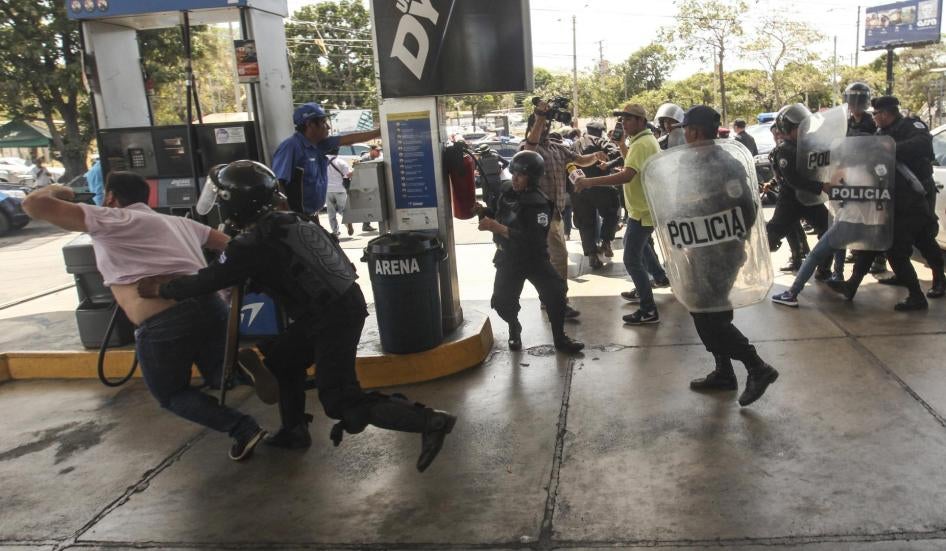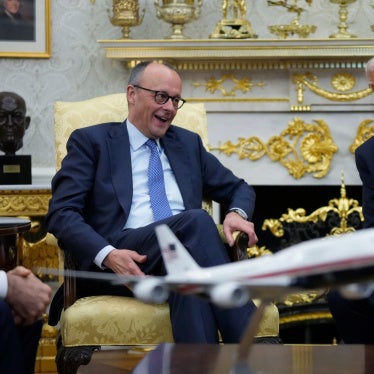(Brussels, July 2, 2019) – The European Union should increase pressure on the Nicaraguan government to curb human rights violations by police and other officials in the wake of anti-government protests, Human Rights Watch said today in a letter to EU High Representative Federica Mogherini and foreign ministers. The EU should impose targeted sanctions against high-level Nicaraguan officials implicated in gross human rights violations and condition financial support to Nicaragua’s National Police.
The crackdown on anti-government protests by Nicaragua’s National Police and armed pro-government groups that began in April 2018 led to more than 300 deaths and 2,000 people injured. A Human Rights Watch report released on June 19, 2019, documented egregious abuse that in some cases amounted to torture of many of the hundreds of people arrested by police or abducted by armed pro-government groups
“President Daniel Ortega will not voluntarily reestablish the basic human rights guarantees that his government worked so hard to dismantle,” said José Miguel Vivanco, Americas director at Human Rights Watch. “Intense and persistent international pressure, including through targeted sanctions against senior officials implicated in gross human rights violations, is key to ending the widespread abuses.”
Human Rights Watch found that prosecutions of people arrested during the crackdown were marred by serious violations of due process and other fundamental rights. The government has also retaliated against independent journalists, nongovernmental organizations, and international human rights monitors.
The EU should impose targeted sanctions on senior government officials responsible for gross human rights violations, Human Rights Watch said. They include President Ortega and six others who directed the police forces implicated in abuses or a detention center where torture was committed, or who were required under Nicaraguan law to investigate alleged rights violations by police officers, and sanction those responsible.
The EU should condition any future financial support to the Nicaraguan National Police on exhaustive national investigations of rights violations and efforts by the authorities to dismantle and prosecute armed pro-government groups.
International pressure has played an important role in the government’s recent release of 392 detainees accused of committing crimes in the context of the protests, Human Rights Watch said. But these releases should not overshadow the fact that many of those released remained under restrictive measures as of June 19. An additional 100 people were arrested and released in March in connection with new demonstrations, showing the need for increased pressure on officials. There have been no prosecutions of security forces responsible for abuses related to the crackdown.
The EU’s high representative has repeatedly expressed concern regarding the situation in Nicaragua. In January, EU foreign ministers stated their “readiness to use all [the EU’s] policy instruments” to “react to further deterioration of human rights and rule of law.” Despite a call by the European Parliament in March, the EU has yet to impose targeted sanctions on a single Nicaraguan official implicated in human rights violations. Some Nicaraguan officials have been sanctioned by the United States and Canada.
The 2018 budget approved by Nicaragua’s National Assembly lists multiple international funding sources for the National Police that year. In October 2018, the EU delegation in Managua confirmed to Human Rights Watch it had allocated 8 million euros to the Nicaraguan government, including the police, for a project covering 2014-2018 to counter organized crime and prevent drug abuse. However, they did not respond to an inquiry as to how much of that money has gone to the police or whether the project would be renewed.
In June, EU parliament members informed Human Rights Watch that “responsible EU institutions” had told them that “as soon as the crisis started” they had stopped the “only project that involved security forces.” They said the only support currently provided to Nicaragua benefited Nicaraguan society and was channeled through Nicaraguan and international organizations. The 2019 approved police budget does not show any donations from the EU.
“The European Union has a key role to play in pressuring the Ortega government to curb abuses and to help victims achieve justice and accountability,” Vivanco said. “It should urgently step up to the task.”








